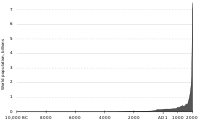
Photo from wikipedia
The principle of indifference has fallen from grace in contemporary philosophy, yet some papers have recently sought to vindicate its plausibility. This paper follows suit. In it, I articulate a… Click to show full abstract
The principle of indifference has fallen from grace in contemporary philosophy, yet some papers have recently sought to vindicate its plausibility. This paper follows suit. In it, I articulate a version of the principle and provide what appears to be a novel argument in favour of it. The argument relies on a thought experiment where, intuitively, an agent’s confidence in any particular outcome being true should decrease with the addition of outcomes to the relevant space of possible outcomes. Put simply: the greater the number of outcomes, the weaker your confidence should be in any one of those outcomes. The argument holds that this intuition favours the principle of indifference. I point out that, in contrast, the intuition is also incompatible with a major alternative to the principle which prescribes imprecise credences: the so-called wide interval view . Consequently, the argument may also be seen as an argument against the wide interval view.
Journal Title: Journal for General Philosophy of Science
Year Published: 2019
Link to full text (if available)
Share on Social Media: Sign Up to like & get
recommendations!